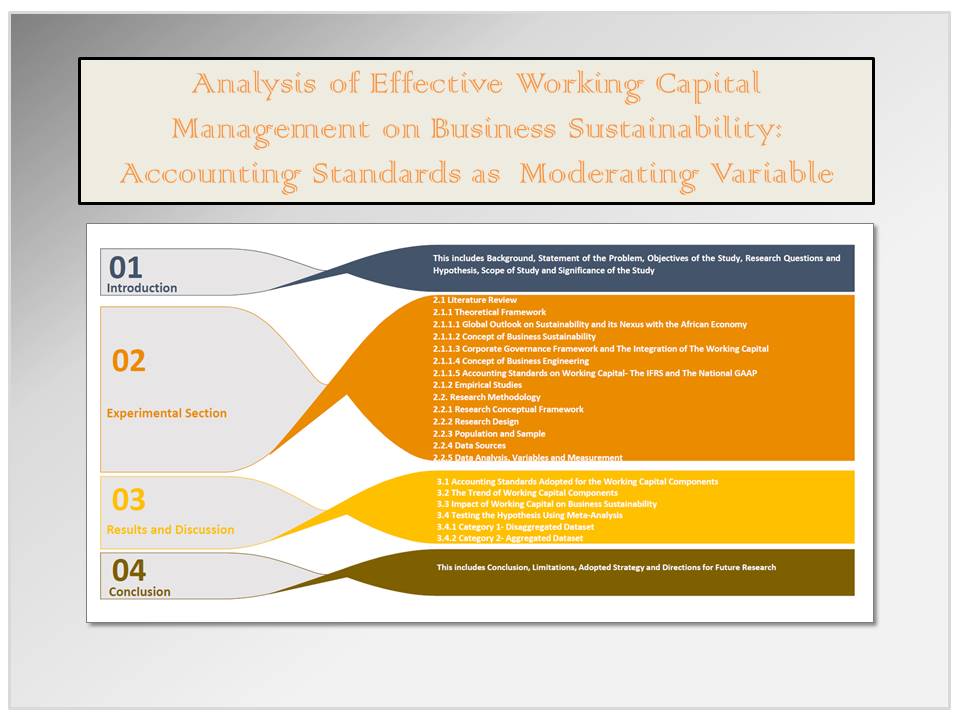Applied Research Frontiers
Title
Analysis of Effective Working Capital Management on Business Sustainability: Accounting Standards as Moderating Variable
Authors
Dr. Adedeji Richard Adeshile
Motherpearl Consulting Limited, Abuja, Nigeria.
*Corresponding author E-mail address: deji.adeshile@gmail.com
Article History
Publication details: Received: 14th December 2022; Revised: 04th January 2023; Accepted: 04th January 2023; Published: 17th January 2023
Cite this article
Adeshile A.R. Analysis of Effective Working Capital Management on Business Sustainability: Accounting Standards as Moderating Variable. Appl. Res. Front., 2023, 2(4), 1-22.

Abstract
This research serves as a complement to filling the practical gap on the impact of effective working capital management on business sustainability by adopting a meta-analysis of several independently published audited annual report and accounts from 2019 to 2021. No doubt, the COVID-19 pandemic has occasioned gaps in trade finance. The research population is the entire fifty-four (54) countries in Africa and taking a statistical position from Africa's Gross Domestic Product (GDP) which was US $2.354 trillion in the year 2020. This research adopted a systematic sampling of clusters considering that the population of Africa by GDP consists of discrete clusters with similar characteristics—this means that the units within each cluster are as heterogeneous as units in the overall population. Africa sub regional categorization was used to ensure comprehensive inclusivity in the research sample selection. This resulted in mapping the sub regions as -- North, South, West, and East. While the country with the highest GDP contribution to the total African GDP under each sub regional categorization was selected as the research sample. Eventually, the selected countries include–Egypt (North Africa), South Africa (Southern Africa), Nigeria (West Africa) and Kenya (East Africa). This represented a 50.66% aggregated GDP contribution to the total African GDP in 2020. The selected entities within the African countries are businesses operating in the real sector (Agribusinesses) that are listed on the stock exchanges. The research study used the SPSS-Structural Equation Modeling (SEM) for descriptive statistics and to process the meta-analysis data. This formed the basis for testing the formulated hypothesis and providing answers to the developed research questions. The software application assessed the relationship between working capital components and business sustainability. Data measurement for the working capital variable was defined as current assets minus current liabilities—which were evident in the published audited financial statements of the selected entities across the African continent. The data measurement for the business sustainability variable was defined as the total assets. Total assets are the total non-current assets and the total current assets. It was discovered that in a line diagram, the shape of the line showing the systematic movement in the net current assets to total assets (explaining the business sustainability variable) is nearly proportionally the same as that of the working capital (explaining the working capital management efficiency) on a three-year comparison—this finding was consistent across the selected entities in West, East, South, and North African sub regions. This finding was also consistent with the meta-analysis that was performed to test the formulated hypothesis. The study recommends that business leaders and those charged with governance should continuously ensure optimal business engineering through integration of the process, people, and technology. Furthermore, they are expected to ensure effective working capital management which subsequently translates to business sustainability.
Keywords
Agribusiness; Business Engineering; Business Management; Corporate Governance; Financial Analysis; Meta-Analysis; SDGs